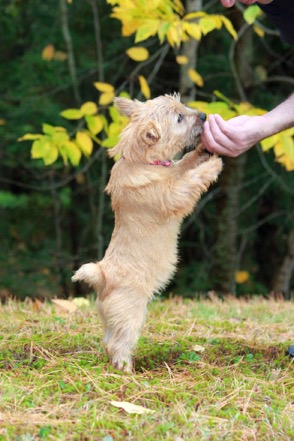 It’s possible to set your new puppy up to fail without ever knowing it.
It’s possible to set your new puppy up to fail without ever knowing it.
Scene 1: You carry your beautiful puppy over the threshold into his loving new home. For the first time in recent memory, your family members put down their phones, notebooks and tablets and swarm to the living room. As if stricken by an alien paralysis ray, everyone drops to the floor as their voices jump several octaves into the kind of talk strictly reserved for babies and puppies. Puppy mingles cordially, passing through a sea of hugging arms and petting hands. It’s a great day!
Scene 2: A week later, puppy fever is still gripping the household. The smell of Nature’s Miracle hangs in the air- but really, how can you be expected to take puppy directly from the crate to the backyard when there’s so much playing to be done?
Scene 3: Almost a month later, bed sheets still hang off the couch cushions. You’ve slept there every night. Puppy’s crate is next to the couch, of course- it’s the only way to ensure that puppy never has to be alone.
Scene 4: Two years later, “puppy” is now “dog,” although sometimes he earns a profane nickname in the heat of the moment. Your waning patience is understandable; it’s hard to get any sleep when your dog is whining and barking all the time. You would take him outside to work off some energy, but you’d hate for him to get in another dog fight or for him to finally bite someone. The honeymoon period is over, and this will be the scene for the rest of your dog’s life.
Just who’s to blame here? Well, not the dog. After all, when he bit people as a puppy they just giggled. When he barked he was coddled, and he has no idea how to handle life alone because he never had to.
And you’re not really to blame either, because you were just trying to love your puppy. What you didn’t know is that in your hurry to gain his affection, you lost his respect and he lost his manners. Now, if you and your dog are already living Scene 4, skip ahead to our On & Off-Leash Obedience, Behavior Modification or Aggressive Dog Rehabilitation pages. If you and puppy are still acting out Scenes 1-3, stop right there! We’re The Ghost of Christmas Future, and we want to save you a lot of heartache.
Puppy training is a necessity. It doesn’t have to be our puppy training or even professional puppy training, it just has to be done correctly. There are several keys to training a puppy:
Socialization: It’s absolutely imperative that you make sure your puppy is properly socialized. That doesn’t just mean you throw your puppy in the deep end and hope he swims. You need to carefully control the environment, people, animals and other variable to make sure he has a positive experience. If things get out of control and you miss the warning signs of aggression you could be dealing with an experience that negatively impacts your dog’s development for life. If you can’t read your dog’s body language or recognize the subtle symptoms of aggression, do not try to socialize your dog without the help of an expert.
Crate Training: Yes, it’s hard. Not because it’s conceptually puzzling or physically demanding, but because it requires discipline. We’re literally talking about resisting “puppy dog eyes.” You need to harden yourself against whimpering and guilt and desensitize your dog to being alone. You won’t always be there, and giving your dog a safe space where he or she can learn to relax is not just good for preventing separation anxiety and chewed furniture, it helps with this next part too.
Housebreaking: Wee-wee pads are a cop-out. You can both do better! By properly crate training your dog and structuring his or her life into a reliable routine, you can save your berber carpet and your dog’s dignity. Housebreaking is a process, and accidents do happen, so make sure you’re not rushing things by giving your dog too much leash around the house, so to speak. Puppy housebreaking is one of the areas we’ll help with during our Puppy Training Program, so if you’re getting frustrated, feel free to contact us.
Foundations in Obedience: lt’s an absolute joy to have a dog that knows recall, stay commands, and tricks! The earlier you start with your puppy, the more automatic good behavior will be later. We don’t want to belabor the point, but you can teach old dogs new tricks- it’s just harder. Instead, you should reinforce good behavior and correct bad behavior now. Give your dog a lifetime of experience doing things the right way! New to training? Find more information about training principles here.
Training a puppy is a decision you’ll never regret. It gives you and your dog the best possible chance to enjoy life together. Your dog will be confident, social and well-behaved. You’ll actually enjoy taking him or her in public instead of dreading it. If you’d like us to help, keep in mind that we offer individual puppy training sessions, puppy training classes and a board & train program.
